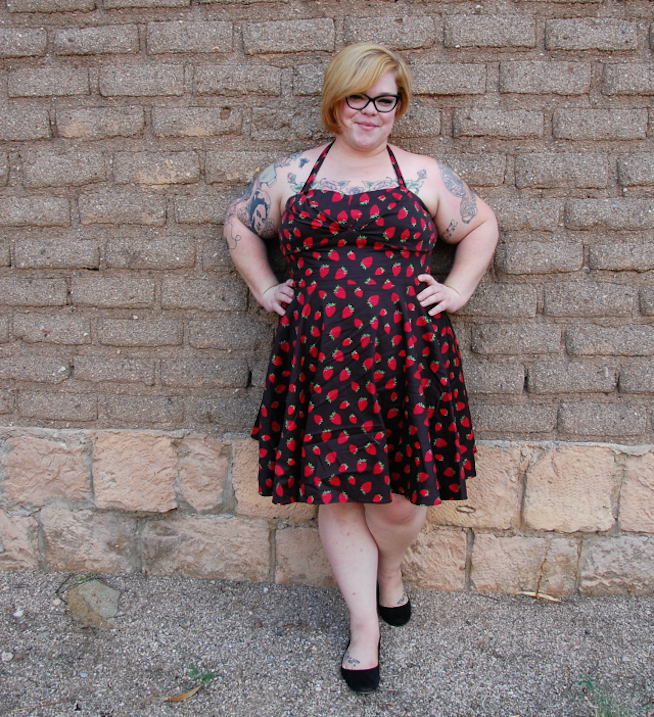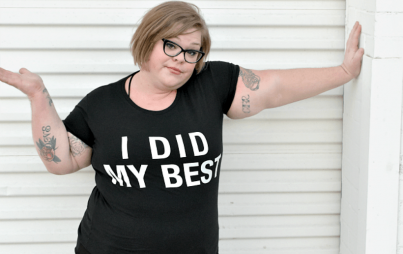
Jes Baker, The Militant Baker.
Body definitions are all relative, and when something’s completely relative . . . it means that ultimately the person’s opinion about their own body is the only one that matters.
My partner and I were at a burlesque performance a little while ago, where someone I had previously dated ended up dancing on stage. This, in addition to watching other female friends perform, provoked a conversation between us about body confidence (and the lack thereof) while watching others get (mostly) naked on stage. In the middle of our dialogue, he said something I would have never expected to leave the mouth of my lover: “Well, I have to be honest . . . your ex makes me feel fat.”
I without thinking quickly shut him down. “Oh babe, you’re not fat!” And in my mind, he’s not. He then responded by saying, “You need to let me define my own body and if I think I’m fat, I’m fat.”
Holy shit. Way to put this body activist in her place, dude.
He was absolutely right.
This was a mind-blowing moment for me, and I had to dig a little internally to understand why I felt so strongly that my boyfriend wasn’t fat. I eventually came to the realization that it had nothing to do with his body and everything to do with mine. I see him as the straight-sized person in our relationship, and it’s even something that I’ve written about extensively. It’s also possible that a lot of other people see him in this light as well, but none of that matters — this is his body and he has the right to define it in whatever way feels good to him.
We continued to discuss this concept and we talked about how I identify as irrefutably fat, yet people online will consistently comment that I’m not really that fat, or even that I’m not fat at all. If I had to guess, I would assume that this has everything to do with their comparison of their body against mine. It only makes sense that their feelings about their size alters the way they see mine. Body definitions are all relative, and when something’s completely relative . . . it means that ultimately the person’s opinion about their own body is the only one that matters.
The opposite situation can happen as well. Tess Holliday’s self-proclaimed size of 22 is largely contested online, often met with the opinion “I'm a size 22. There’s no way she’s that small.” What this says to me is that said commenter is uncomfortable being compared (even if only in their mind) with someone who they don’t want to identify with. Again, not about the original person but rather the person on the outside looking in. It’s interesting how often this happens.
Even though this is something I’ve thought about for a while, I found myself making this mistake today when I saw a photo of Kate Winslet on Facebook where she said “I know I’m chubby” and continued to talk about how she valued her authentic self no matter what. My instant reaction when I compared these words against her portrait was to say: YOU’RE NOT CHUBBY KATE! WTF ARE YOU THINKING?
Wrong answer. Try again, Jes. The reality is that Kate Winslet feels that she’s chubby, and in her mind, world, and community she is. I’ll say it again: this is 100% valid.
Now, as a public body activist, I try to be sensitive to how my words affect others. The importance of this was solidified not too long ago after publishing an article here on Ravishly where I wrote, “So yes, I’m fat now. Like super fucking fat.” A message from another activist and friend quickly landed in my inbox and read:
“Hello Lovely, I read the new essay about those asshats with too much time and a copy of photoshop. I love the way you approached this. There was some wording in the essay though that snagged my proverbial sweater. At one point you refer to yourself as "super fucking fat" and I can see how mirrored against societal beauty standards you could be identified that way, in the fat community you wouldn't be and it feels a little like erasure of Super Fats like myself when smaller bodies fats claim the title. I definitely know you don't mean it that way but I did want to share my feelings on it with you just in case someone else feels the same way. I appreciate you and your work so I hope I am not overstepping in bringing this up.”
Not only did I appreciate the kind tone in which this correction was shared, but I loved the explanation of something I would have never considered. I wrote back that this never crossed my mind and THANK YOU for bringing it to my attention. My editor then rectified this situation immediately.
But Jes, you just said we should let everyone identify however they want. Doesn’t this include you and I? Yes, my friend, it does! However, when someone expresses the feeling of erasure due to the words I use, I like to respect their feelings and needs. And why not? It doesn’t invalidate my body in any way, and it offers space for other bodies to exist as well.
The moral of these stories? #1: Let's start letting others define their bodies without feeling the need to challenge them. #2: When we contest someone’s definition of their body, it says a lot more about us than about them . . . so let’s check in with ourselves when this happens. And #3? Being aware of how your personal labeling of your body affects others is an awesome thing.
I really love the idea of a world in which we’re allowed to define ourselves, our worth, our talents, our importance, and yes . . . even our bodies.








